La Belle au bois dormant is an opera in three acts by Michele Carafa to a French libretto by Eugène de Planard after the tale by Charles Perrault.
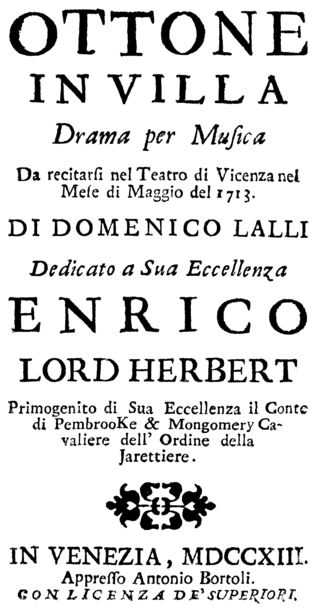
Ottone in villa is an opera in three acts by Antonio Vivaldi to an Italian libretto by Domenico Lalli. It was Vivaldi's first opera and premiered on 17 May 1713 at the Teatro delle Garzerie in Vicenza. Lalli's pastoral drama is set in ancient Rome and was a condensed adaptation of Francesco Maria Piccioli's satirical libretto for Carlo Pallavicino's opera Messalina (1679). However, Lalli changed several of the characters in Piccioli's libretto. Messalina became an invented character, Cleonilla. The Roman Emperor Claudius became another emperor, Otho (Ottone), who had already appeared as a protagonist in Monteverdi's L'incoronazione di Poppea (1642) and in Handel's Agrippina (1709).
Dano Raffanti is an Italian tenor, particularly associated with the Italian baroque and bel canto repertory.
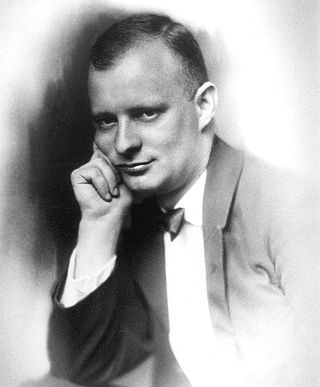
Neues vom Tage is a comic opera in three parts by Paul Hindemith, with a German libretto by Marcellus Schiffer.
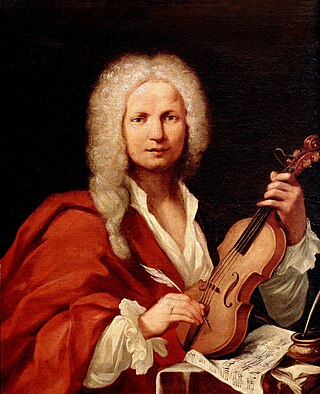
L'incoronazione di Dario is a dramma per musica by Antonio Vivaldi with an Italian libretto by Adriano Morselli. The opera was first performed at the Teatro Sant'Angelo in Venice on 23 January 1717.

Scanderbeg is an opera in three acts composed by Antonio Vivaldi to an Italian libretto by Antonio Salvi. It was first performed at the Teatro della Pergola in Florence on 22 June 1718 to mark the re-opening of the theatre to public performances. While the libretto has been preserved, only fragments of the original score remain.

Medea is an opera in three acts composed by Giovanni Pacini to a libretto by Benedetto Castiglia. It premiered on 28 November 1843 at the Teatro Carolino in Palermo, conducted by the composer with Geltrude Bortolotti in the title role. The libretto is based on the plays Medea by Euripides and Médée by Pierre Corneille.

Siroe, or Siroe re di Persia, is an opera seria in three acts by Johann Adolph Hasse. The libretto was by Metastasio. As with many of the latter's libretti, Siroe was also set by Hasse's contemporaries, for example Vinci, Vivaldi and Handel.
L'incoronazione di Dario is an opera in three acts composed by Giacomo Antonio Perti to an Italian libretto by Adriano Morselli. It was first performed on 13 January 1686, at the Teatro Malvezzi in Bologna. Morselli originally wrote the libretto for Domenico Freschi's opera Dario which premiered at the Teatro San Angelo in Venice in 1685. Other later uses of the libretto include Giuseppe Aldrovandini's 1705 L'incoronazione di Dario and Vivaldi's 1717 L'incoronazione di Dario.

Modo Antiquo is an Italian instrumental ensemble dedicated to the performance of Baroque, Renaissance, and Medieval music. It was founded in 1984 by Federico Maria Sardelli. Twice nominated for a Grammy award, the ensemble has an extensive discography, primarily on the Naïve, Brilliant Classics, and Tactus labels and have given the first performances in modern times of several works by Vivaldi. Modo Antiquo's larger ensemble is its Baroque orchestra led by Sardelli. It also has a smaller ensemble devoted to Medieval and Renaissance music led by Bettina Hoffmann.

Domenico Giacinto Fontana (1692–1739), also known as "Farfallino", was an Italian castrato singer active primarily in Rome from 1712 to 1736. He specialised in singing soprano female roles and earned the name "Farfallino" for his graceful stage appearance. He was born in Perugia and died there at the age of 47. At times he feared ridicule by performing certain roles, such as a pregnant primadonna.
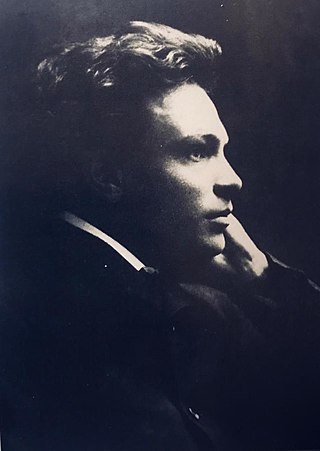
La bella dormente nel bosco is an opera in three acts by Ottorino Respighi to a libretto by Gian Bistolfi based on Charles Perrault's fairy tale "Sleeping Beauty".
Giuseppe Ferdinando Brivio was an Italian composer, conductor, violinist, and singing teacher who is chiefly known for his operas. His work displays a natural expression and uses figurations similar to that of Antonio Vivaldi.

Il Giustino is an opera in three acts by composer Giovanni Legrenzi. The work uses an Italian-language libretto by Nicolò Beregan based on the life of Emperor Justin I. The opera premiered on 12 February 1683 at the Teatro San Salvador in Venice; Selfridge-Field gives 7 February as the date. Legrenzi dedicated the work to Alexander Farnese, Duke of Parma.
Nitocri is an opera in two acts composed by Saverio Mercadante to libretto by Apostolo Zeno adapted by Lodovico Piossasco Feys. The libretto is a fictionalised account of the Egyptian queen Nitocris. The opera premiered at the Teatro Regio in Turin on 26 December 1824.

Maria Caterina Negri was an Italian contralto who created numerous roles in 18th-century operas, including many by George Frideric Handel. She primarily portrayed male characters en travesti or female warriors such as Bradamante. Negri was born in Bologna and made her debut there at the age of 15. Her last known performance was in 1744. The date and place of her death are unknown. In its prime, her voice was known for its agility and wide vocal range.
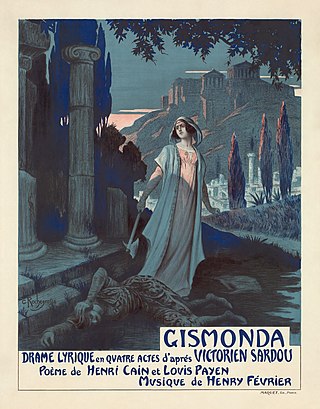
Gismonda is a 1919 French-language grand opera in three acts by Henry Février to a libretto by Henri Caïn and Louis Payen based on the 1894 play Gismonda by Victorien Sardou. The planned premiere in Paris was halted by the outbreak of World War I but the composer was given leave from the French army to premiere the opera with Mary Garden in the title role with the Chicago Opera Association on 14 January 1919. Février was also present when the production was then shown in New York City at Loew's Lexington Theatre on January 27 that year. It premiered in Paris at the Opéra-Comique on 15 October of the same year.
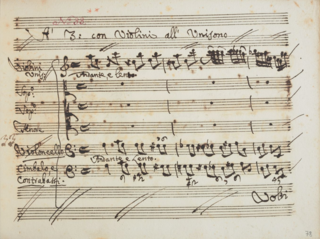
Carlo re d'Allemagna is a three-act dramma per musica by Italian composer Alessandro Scarlatti to a libretto by Giuseppe Papis, after Francesco Silvani, premiered at the Teatro San Bartolomeo of Naples on 26 or 30 January 1716. This is the composer's 79th opera out of 114 composed.
Magda Piccarolo was an Italian soprano and voice teacher. Active as an opera singer from 1933 through 1959, she was particularly celebrated for her portrayal of Gilda in Giuseppe Verdi’s Rigoletto. She later was active as a teacher of singing both privately and at the Milan Conservatory.












